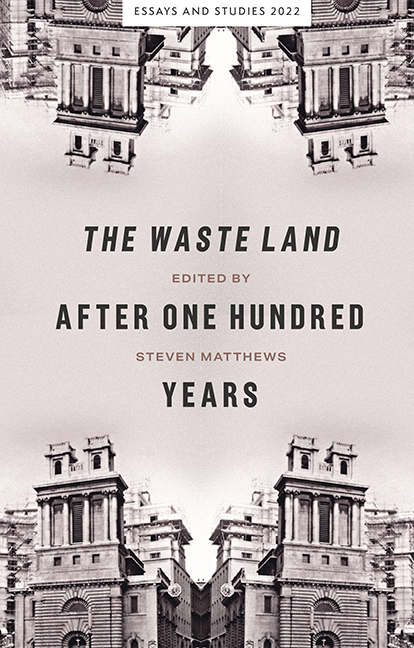Book contents
- Frontmatter
- Contents
- Notes on Contributors
- Introduction
- 1 A ‘Dangerous Model’: Resisting The Waste Land
- 2 Beyond the Sanskrit Words: Eliot and the Colonial Construction of Poetic Modernism
- 3 ‘An Icon of Recurrence’: The Waste Land’s Anniversaries
- 4 ‘O City, city’: Sounding The Waste Land
- 5 Lost and Found in Translation: Foreign Language Citations in The Waste Land
- 6 The Poetic Afterlife of The Waste Land
- 7 Compositional Process and Critical Product
- 8 Hypocrisy and After: Persons in The Waste Land
- Index
6 - The Poetic Afterlife of The Waste Land
Published online by Cambridge University Press: 08 October 2022
- Frontmatter
- Contents
- Notes on Contributors
- Introduction
- 1 A ‘Dangerous Model’: Resisting The Waste Land
- 2 Beyond the Sanskrit Words: Eliot and the Colonial Construction of Poetic Modernism
- 3 ‘An Icon of Recurrence’: The Waste Land’s Anniversaries
- 4 ‘O City, city’: Sounding The Waste Land
- 5 Lost and Found in Translation: Foreign Language Citations in The Waste Land
- 6 The Poetic Afterlife of The Waste Land
- 7 Compositional Process and Critical Product
- 8 Hypocrisy and After: Persons in The Waste Land
- Index
Summary
This chapter explores some of the ways in which Eliot's most famous poem remains a significant and sometimes a ghostly presence, in poetry of the later twentieth and early twenty-first centuries. A number of critics have considered its influence on, or parallels with, later poets or poems, some of which will be discussed here. What follows is not by any means a complete survey of its widely-diffused poetic afterlife, but a consideration of both some generally influential elements of The Waste Land and examples of how specific poets writing in the last seventy years have engaged with its legacies.
There are many ways of conceiving of a relation between a poem and its potential precursors. The venerable concepts of ‘imitation’ (with classical and religious origins) and ‘influence’ are always ready to hand. There are various genre-based categories: ‘imitation’ again but also parody, pastiche, tribute, version, adaptation. Then there are conceptions which carry a psychological, social or evaluative view of such relation: Harold Bloom's wellknown anxiety of influence, which conceives of it in Oedipal (masculinized) and competitive terms is a psychological theory; in contrast, Christopher Ricks's metaphor of friendship uses primarily social terms (such as ‘a nod to’, ‘generosity’, ‘livingly grateful’). What Ricks proposes is less a theory than a mode of discussion. With grander cultural claims, there is of course Eliot's own concept of the ‘tradition’. While his idea of ‘the literature of Europe’ as a ‘simultaneous order’ may now seem monolithic and overly Platonic, the claim that this order is modified by the introduction of new works, that ‘the past should be altered by the present’, remains resonant and of particular relevance to The Waste Land. In contrast to human forms of relation such as rivalry or friendship, ‘intertextuality’ displaces the relation from author to text, while approaching an encompassing view of all literary texts, in a way which may tend to dissipate specificity of relation. The metaphor of the ‘afterlife’ of texts, which has become popular in academic circles over the last twenty years or so, brings in connotations of ghostly presence, responding perhaps to the persistent fascination of the gothic, and has a certain appropriateness to a discussion of The Waste Land, given the poem's staging of ghostly encounters.
- Type
- Chapter
- Information
- The Waste Land after One Hundred Years , pp. 131 - 156Publisher: Boydell & BrewerPrint publication year: 2022



